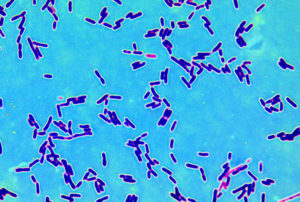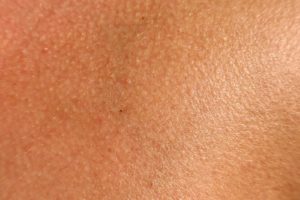
Chronic wounds (wounds that won't heal) are a big health problem for many, many people. This past decade has seen all sorts of advances in chronic wound healing treatments, and now there is a future possibility of also applying probiotics on the wounds.
A recent study showed "proof of concept" that some Lactobacillus species are effective in eliminating biofilms and Pseudomonas aeruginosa on skin, which are big problems in chronic wounds. Proof of concept means that a preliminary study using laboratory tests (using "living skin" in a human skin model) showed that it can work, and should be tested further.
The researchers tested a treatment using several species of Lactobacilli (L. acidophilus, L. casei, L. rhamnosus). They found that probiotics added to a modern wound dressing that contained silver did better at eradicating biofilms than using silver containing dressings alone or probiotics alone. (Note: Lactobacillus species are generally viewed as beneficial bacteria, and many Lactobacillus species live at different sites in the human microbiome, which are communities of fungi, bacteria, and viruses.)
The interesting part is that the species picked for the research were because they were in supplements readily available. The researchers cited research showing other Lactobacillus species also having potential in wound treatment, especially due to effects of their lactic acid.
It's an exciting time! Stay tuned to see if probiotic infused dressings actually work on chronic wounds in live human beings...
From Physics News: A living bandage: Wound dressing uses probiotic bacteria to combat biofilms
Millimeter by millimeter, new tissue makes its way through a wound until it has closed a skin lesion. Soon, in the best case, there is nothing left to see of a knee scrape, a finger cut or a burn blister. Not so with chronic wounds, though: If the injury has not healed after four weeks, there is a wound healing disorder. Sometimes, seemingly harmless tissue damage can develop into a permanent health problem or even blood poisoning.
...continue reading "Could Probiotics Play A Role In Chronic Wound Healing?"

 It turns out that scurvy and vitamin C deficiency is still around these days. Scurvy is a disease resulting from a lack of vitamin C. Most animals can synthesize vitamin C, but not humans. We must eat foods containing vitamin C to get the vitamin.
It turns out that scurvy and vitamin C deficiency is still around these days. Scurvy is a disease resulting from a lack of vitamin C. Most animals can synthesize vitamin C, but not humans. We must eat foods containing vitamin C to get the vitamin. Now we need ways to nurture our skin bacteria. From Science Daily:
Now we need ways to nurture our skin bacteria. From Science Daily: